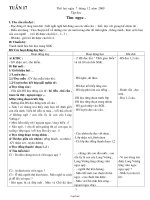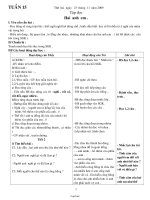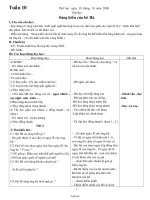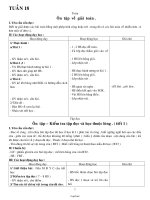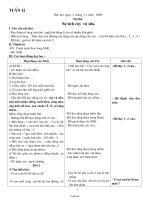bài nghe lớp 2 hay unit 2 i go to school by bus
Bạn đang xem bản rút gọn của tài liệu. Xem và tải ngay bản đầy đủ của tài liệu tại đây (295.11 KB, 34 trang )
lOMoARcPSD|22506047
Listening - sczv xcb
tư tưởng hồ chí minh (Trường Đại học Văn Lang)
Scan to open on Studocu
Studocu is not sponsored or endorsed by any college or university
Downloaded by vân m? ()
lOMoARcPSD|22506047
VSTEP LISTENING PRACTICE TEST
Time allowance: approximately 40 minutes
Number of questions: 35
Directions: In this section of the test, you will have an opportunity to demonstrate your
ability to understand conversations and talks in English. There are three parts in this
section with special directions for each part. Answer all the questions on the basis of what
is stated or implied by the speakers in the recording.
The recording will be played ONCE only.
LISTENING TEST 1
PART 1: Questions 1-8
Directions: In this part, you will hear EIGHT short announcements or instructions. There is
one question for each announcement or instruction. For each question, choose the right
answer A, B, C or D. Then, on the answer sheet, find the number of the question and fill in
the space that corresponds to the letter of the answer that you have chosen.
Now, let’s listen to an example. On the recording, you will hear:
Woman: Hello. This is the travel agency returning your call. You left a message about the
holiday you’ve booked, asking which meals are included in the cost during your stay at
Sunny Hotel. Lunch and dinner are free but if you wish to have breakfast in the hotel, you
will need to pay an extra amount of money, depending on what you order. Let me know if I
can help you with any other information.
Goodbye.
On the test book, you will read:
Which meal is NOT included in the price of the holiday?
A. Breakfast B. Lunch C. Dinner D. All meals
The correct answer is A. Breakfast. Now, let’s begin with the first question.
1. How did he feel in his first job?
A. bored B. confused C. enthusiastic
2. What are listeners being invited to?
A. a show B. a talk C. a party
3. Who was she?
A. a pedestrian B. a driver C. a passenger
4. What is her main point?
A. Being in the right place at the right time is a matter of luck.
B. More time is spent planning than filming.
C. It is worthwhile spending time preparing.
5. Where is the speaker?
A. outside a café B. by the sea C. on a lake
Page 1 of 33
Downloaded by vân m? ()
lOMoARcPSD|22506047
6. What does she want the shop assistant to do about her table-tennis table?
A. provide her with a new one
B. have it put together for her
C. give her the money back
7. What is her business?
A. hiring out boats B. hiring out caravans C. building boats
8. Who is talking?
A. an actor B. a journalist C. a theatre-goer
PART 2: Questions 9-20
Directions: In this part, you will hear THREE conversations. The conversations will not be
repeated. There are four questions for each conversation. For each question, choose the
correct
answer A, B, C or D
Questions 9 to 12 refer to the following conversation.
9. Where is the woman?
(A) At a hotel
(B) At a restaurant
(C) At a conference
(D). At a laundry room
10. What service is the woman asking about?
(A) Room cleaning
(B) Laundry service
(C) Express check-in
(D) Conference room rental
11. When most likely will the woman give a speech?
(A) On Sunday
(B) On Monday
(C) On Tuesday
(D) On Wednesday
12. What will the man probably do next?
(A) Process the woman’s payment
(B) Help the woman with her luggage
(C) Take the woman’s jacket
(D) Give the woman a bag
Questions 13 to 16 refer to the following conversation
Page 2 of 33
Downloaded by vân m? ()
lOMoARcPSD|22506047
13. Why does the woman say the meeting should be postponed? Page 3 of 33
(A) Some important data is missing.
(B) Some employees will be absent.
(C) The computer system has a problem.
(D) An executive is scheduled to visit the office.
14. Who is likely a woman?
(A) a manager
(B) a salesperson
(C) a doctor
(D) a shop assistant
15. When will the meeting most likely be held?
(A) Thursday morning
(B) Thursday afternoon
(C) Friday morning
(D) Friday afternoon
16. What will the man probably do next?
(A) Visit a computer facility
(B) Take a lunch break
(C) Reserve a meeting room
(D) Write an e-mail message
Questions 17 to 20 refer to the following conversation
17. Why is the man traveling to India?
(A) To study at a university
(B) To sell his company’s products
(C) To attend a conference
(D) To look for an apartment
18. What does the man say about the bag?
(A) It is lightweight.
(B) It is fashionable.
(C) It is too expensive.
(D) It is too small.
19. What does the woman offer to do?
(A) Show the man a different part of the shop
Downloaded by vân m? ()
lOMoARcPSD|22506047
(B) Look for other products on a computer
(C) Give the man a discount
(D) Repair an item for the man
20. When will the product be shipped?
(A) Within 24 hours
(B) Within a week
(C) Within a month
(D) Within 2 days
PART 3: Questions 21-35
Directions: In this part, you will hear THREE talks, lectures or conversations. The talks,
lectures, or conversations will not be repeated. There are five questions for each talk, lecture,
or conversation.
For each question, choose the right answer A, B, C or D.
Questions 21 to 25 refer to the following radio interview.
21. Stan says that the best thing about walking is that you can
A. get fit by doing it.
B. please yourself how you do it.
C. do it on your own.
22. Stan’s opinion on scrambling is that
A. people doing it may need to be accompanied.
B. it is unsuitable for beginners.
C. it is more exciting than walking.
23. What did Stan discover when he went climbing?
A. It was not enjoyable.
B. It was harder than he expected.
C. It can be very frightening.
24. What does Stan say about mountain biking?
A. Britain is not the best place for it.
B. It is more expensive in Britain than elsewhere.
C. It is best where there are lots of downhill slopes.
25. Stan’s advice on scuba diving is that
A. most of the courses for it are good.
B. it is easier than it seems.
C. you should think carefully before trying it.
Page 4 of 33
Downloaded by vân m? ()
lOMoARcPSD|22506047
Questions 26- 30 refer to the following radio interview
26. How did Douglas feel when he booked the weekend?
A. sure that he would enjoy training for it
B. uncertain if it was a good idea for him
C. surprised that such activities were organized
27. Douglas expected that the experience would help him to
A. meet people with similar interests.
B. improve his physical fitness.
C. discover his psychological limits.
28. He was surprised that the other participants
A. were there for reasons like his.
B. were experienced climbers.
C. were in better condition than him.
29. What did one of his friends say to him?
A. He was making a mistake.
B. Climbing was fashionable.
C. She was envious of him.
30. What did the people plan at the end of the trip?
A. to send each other postcards
B. to take a different sort of trip together
C. to go on another climbing trip together
Questions 31 to 35 refer to the following radio interview.
31. What was the origin of Martin Middleton’s love of travel?
A. living abroad in the 1960s
B. something he read as a child
C. a television film about Africa
32. When he visited Borneo, Martin
A. had no fixed expectations
B. made a program about life on the river
C. became more interested in filming old buildings
33. Since the early 1960s, wildlife filming has become
A. more relaxed B. more creative C. more organized
34. Looking back, Martin regards his experience on the iceberg as
A. slightly ridiculous B. extremely C. strangely depressing
Page 5 of 33
Downloaded by vân m? ()
lOMoARcPSD|22506047
35. When he takes a holiday, Martin prefers to
A. relax by the sea
B. stay in comfortable surroundings
C. travel for a particular reason
LISTENING TEST 2
PART 1 (Questions 1-8)
In this part, you will hear EIGHT short announcements or instructions. There is one
question for each announcement or instruction. For each question, choose the right
answer A, B, C or D. Then, on the answer sheet, find the number of the question and fill
in the space that corresponds to the letter of the answer that you have chosen.
1. How far was the man from the beach?
A. one mile. B. two miles.
C. three miles. D. four miles.
2. Where did the twins find each other?
A. at a party. B. in college.
C. a family reunion. D. at high school
3. How much money did the man get?
A. $130,000 B. $135,000
C. $145,000 D. $115,000
4. How far had the camera floated?
A. 1,010 miles B. 1,011 miles.
C. 1,100 miles. D. 1,000 miles.
5. Who placed the babies next to each other?
A. a nurse. B. a doctor.
C. their mother. D. their sister
6. Why didn’t the people hear the smoke alarm?
A. It was broken. B. The parrot imitated the sound
C. They didn’t have one. D. It wasn’t very loud.
7. Where were they made?
A. In Italy. B. In China.
C. In the U.S. D. In Spain
8. What is it made of?
Page 6 of 33
Downloaded by vân m? ()
lOMoARcPSD|22506047
A. cotton. B. leather.
C. wool. D. wood
PART 2 (Questions 9-20)
In this part, you will hear THREE conversations. The conversations will not be
repeated. There are four questions for each conversation. For each question, choose
the correct answer A, B, C or D.
Questions 9 to 12 refer to the following conversation.
9. How many cakes did the man order?
A. Four. B. Five.
C. Ten. D. Twelve.
10. What is the woman saying will not be enough for that day?
A. The cakes. B. The people who are coming.
C. The roses. D. The budget.
11. What should they try to do?
A. spend more money.
B. make sure everything is enough for the event.
C. cut the cakes in small pieces for many people.
D. tell people not to come.
12. What will make the boss pleased?
A. their preparation B. to let them spend some more money
C. the fixed budget D. the new budget
Questions 13 to 16 refer to the following conversation.
13. Who is the man?
A. A store clerk. B. A doctor.
C. A patient. D. A teacher.
14. What does the woman tell Mr. Stevens to do?
A. Don’t smoke. B. Make an appointment next week.
C. Take an X-ray. D. Drink only a little.
15. Why did Mr. Stevens probably call her Dr. Bothering?
A. She was mean to other people. B. The woman’s name is Bothering.
C. He heard a lot of complaints. D. Joking around, they are close together.
16. What can be inferred from the conversation?
A. She will see the man next time B. She will call the man next time
C. She is setting the appointment for the man. D. She does not want to be bothered
Page 7 of 33
Downloaded by vân m? ()
lOMoARcPSD|22506047
Questions 17 to 20 refer to the following conversation.
17. What are the receipts for?
A. Travel expenses.
B. Office supplies.
C. Product sales.
D. Delivery costs.
18. What is the woman trying to get?
A. A loan from her company.
B. An airplane ticket for her business trip.
C. Insurance money for her trip.
D. Her money back from her company.
19. What can you say about her financial situation?
A. She is trying to invest more money into stocks.
B. She is getting loans to buy a house.
C. She is short of some money.
D. She is making a good salary.
20. What will the man do?
A. check his mailbox again
B. pay the woman
C. go to conference trip in Singapore
D. miss her email
PART 3 (Questions 21-35)
In this part, you will hear THREE talks or lectures. The talks or lectures will not be
repeated. There are five questions for each talk or lecture. For each question, choose
the right answer A, B, C or D.
Questions 21 to 25
Listen to a talk given by a professor about the poet Sylvia Plath
21. What is The Bell Jar?
A. about her father. B. her first novel.
C. a very successful collection of poems. D. her last poem.
22. What happened to Sylvia Plath’s ‘Collected poems’?
A. won the Pulitzer Prize twenty years after it was published.
B. were written during the last year of her life.
C. won the Pulitzer Prize in 1982.
Page 8 of 33
Downloaded by vân m? ()
lOMoARcPSD|22506047
D. were never published.
23. What can we know about Sylvia’s husband?
A. made movies. B. died in 2003.
C. was also a poet. D. had a movie made about him.
24. What did Susan Bassnett think about Sylvia’s work?
A. was about her husband B. wasn’t very good.
C. was about work life D. was of great interest to women
25. What can we know about Sylvia’s brother?
A. was born two years after her B. was two years older than her
C. was a professor at Boston University. D. was a highly educated academic.
Questions 26-30
Listen to a lecture given by a professor about facial recognition
26. Where does the TV show ‘Las Vegas’ take place?
A. in a shopping mall B. in a police department
C. in a casino D. in a crime lab
27. What is a faceprint?
A. a code which identifies a face B. distinctive curves in the face
C. a 2D image of the face D. the number of nodal points on the face.
28. Which one is the problem with 2D facial recognition from the list below?
A. It is still effective if a picture is dark
B. the person in the photograph must face the camera
C. facial curves change over time
D. Nodal points cannot be measured.
29. What is the problem with the 3D technology?
A. It can only be used when the individual is directly facing the camera.
B. the image might change over time
C. It is impossible to match a 3D image to a 2D image
D. It cannot distinguish between identical twins
30. Which element below can be measured by Skin Biometric?
A. the curve of the chin B. the skin’s depth
C. the existences of lines on the face. D. the distance between the eyes.
Questions 31-35
Listen to the lecture about population growth
31. What is the number of children born per 1000 people per year?
Page 9 of 33
Downloaded by vân m? ()
lOMoARcPSD|22506047
A. Replacement Level B. Fertility Level
C. Birth Rate. D. Fertility Level.
32. Which of the following countries in the UK has the highest fertility rate?
A. England B. Scotland
C. Wales D. Northern Ireland
33. Why is fertility rate in the UK higher than it was twenty years ago?
A. Couples are choosing to have larger families
B. a higher proportion of women are having children
C. women who delayed childbirth are having children now.
D. Fewer women are interested in their careers.
34. What proportion of women in their mid-forties do not have children nowadays?
A. 10% B. 4%
C. 25% D. 40%
35. Which reason for low fertility rates is NOT mentioned?
A. women are increasingly focused on their jobs
B. Children are considered to cost a lot of money.
C. Parents do not have time to have many children.
D. People want to enjoy their lives before taking on responsibility.
LISTENING TEST 3
PART 1 – QUESTIONS 1 – 8
Directions: In this part, you will hear EIGHT short announcements or instructions.
There is one question for each announcement or instruction. For each question, choose
the right answer A, B, C or D.
Now, let’s listen to the example. On the recording, you will hear:
Man: May I have your attention, please? Please be advised that there has been a change in
the conference schedule. The speaker for the 2 o’clock presentation has a family emergency,
so he won’t be able to make it. So please note that there is no presentation at 2.
On the screen, you will see:
What is being announced?
A. a change in a speaker
B. the cancelation of a lecture
C. the change of a venue
D. the confirmation of a schedule
The correct answer is B. the cancelation of a lecture. Now, let’s begin with the first question.
Page 10 of 33
Downloaded by vân m? ()
lOMoARcPSD|22506047
1. How will the woman get to the airport?
A. she will get a ride with the man B. she will ride the airport shuttle
C. she will drive her car D. she will rent a car
2. What does the woman want to eat?
A. she would like eggs and potatoes B. she wants eggs and pancakes
C. she wants to eat potato pancakes D. pancakes is what she would like to eat
3. How many boxes of cookies did the man order?
A. the man bought one box of cookies B. the man ordered four boxes of cookies
C. he purchased five boxes of cookies D. he did not order any cookies this year
4. What is the correct area code for the woman?
A. the number is 6-9-1 B. the area code is 1-9-6
C. 9-1-6 is the area code D. 6-1-9 is the correct number
5. How much per copy will the woman pay?
A. she will pay eight cents per page B. the price is ten cents a copy
C. she owes 15 cents per copy D. 20 cents per page is the price
6. How much will the woman pay?
A. one dollar a minute B. one dollar a page
C. 2 dollars and 50 cents a minute D. 2 dollars and 50 cents a page
7. What does the woman want to do?
A. see a documentary B. change the channel
C. watch television D. go to a movie
8. What does the man want the woman to do?
A. he wants all 20 dollar bills
B. he wants all 50 dollar bills
C. he wants all large bills
D. he wants some 20 dollar and some 50 dollar bills
PART 2 (Questions 9-20)
In this part, you will hear THREE conversations. The conversations will not be
repeated. There are four questions for each conversation. For each question, choose the
correct answer A, B, C or D.
Questions 9 to 12
Page 11 of 33
Downloaded by vân m? ()
lOMoARcPSD|22506047
Listen to a conversation about a tragic event
9. What is the topic of this conversation?
A. Fire damage to some apartments
B. How to prevent fires
C. An apartment fire and what one can learn from it
D. An early morning news story
10. According to the woman, how extensively were the apartments damaged?
A. One was damaged more severely than the others
B. All the apartments were completely destroyed
C. There was one thousand dollars of damage
D. All twenty apartments suffered some damage
11. What did the man say about some of the apartment residents?
A. They were killed
B. They were taken to the hospital
C. The damage to the apartments was more serious than the harm to the residents
D. They weren’t frightened.
12. What advice does the man give to the woman to protect herself from fires?
A. Call the fire department
B. Rush to the hospital
C. Listen for a smoke alarm
D. Have an alarm and extinguisher in good condition
Questions 13 to 16
Listen to a conversation between two students
13. What are the man and woman discussing in this conversation?
A. A presentation for political science class
B. How quickly time passes
C. The differences between the various types of courts
D. A schedule for preparing for a political science exam
14. What will the man and woman discuss during their presentation?
A. Three levels of courts
B. Only the municipal courts
C. The state but not the federal courts
D. Only the state and federal courts
Page 12 of 33
Downloaded by vân m? ()
lOMoARcPSD|22506047
15. When do they next plan to meet?
A. On Thursday
B. On Monday
C. In a week
D. Before Monday
16. How much time do they have to prepare for the presentation?
A. Plenty of time
B. Until Monday
C. About one week
D. Until a week from Monday
Questions 17 to 20
Listen to a conversation between two friends
17. When does the conversation probably take place?
A. Just before a vacation
B. Just after the end of a school semester
C. At the end of the summer
D. Just after a break from school
18. What are the man and woman discussing?
A. A trip to visit the Eskimos
B. A trip the woman is planning to take
C. A trip the man has already taken
D. A camping trip the man and the woman took
19. Which of the following is NOT part of the kayaking trip?
A. Sleeping outside on the ground
B. Spending time in a hot tub
C. Relaxing at the lodge
D. Enjoying excellent food
20. How does the woman feel about taking a kayaking trip?
A. She’d be scared, but she’d like to try
B. She can’t wait
C. It would be quite exciting for her
D. She’d prefer not to cry
Page 13 of 33
Downloaded by vân m? ()
lOMoARcPSD|22506047
PART 3 (Questions 21-35)
In this part, you will hear THREE talks or lectures. The talks or lectures will not be
repeated. There are five questions for each talk or lecture. For each question, choose the
right answer A, B, C or D.
Questions 21 to 25
Listen to a talk given by a professor
21. What prompted the conversation?
A. The man wants to place a classified ad in the newspaper.
B. The woman wants to find an apartment close to school
C. The man wants to pay for a newspaper subscription
D. The woman wants to fill out an application for employment
22. What does the man want to sell?
A. furniture
B. books
C. garden supplies
D. an apartment
23. What is the man’s last name?
A. Martin
B. Martyn
C. Wynn
D. Wartin
24. How will the man pay?
A. He will pay by check
B. He will have the amount billed to his home address
C. He will give the woman cash
D. He will come back to pay when he is billed
25. Why does the man decide to revise what he has written?
A. To make it clearer to understand
B. To make it longer to read
C. To make it cheaper to print
D. To make it easier to use
Questions 26-30
26. What is the purpose of the conversation?
A. To help the woman make a purchase
Page 14 of 33
Downloaded by vân m? ()
lOMoARcPSD|22506047
B. To request the woman’s identification Page 15 of 33
C. To show the woman how to make out a check
D. To register the woman for a course at City colleage
27. What is meant by the term cash?
A. Money
B. Money or credit cards
C. Credit cards or checks
D. Checks or money
28. How does the woman pay for her purchase?
A. Credit card
B. money
C. debit card
D. check
29. What did the woman use as identification?
A. She used her student ID and a charge card
B. She used her credit card
C. She used her driver’s license and her student ID card
D. She used her telephone number and her student ID card
30. Who is the man in this conversation?
A. A clerk
B. The woman’s husband
C. A police officer
D. A bank teller
Questions 31-35
31. What is the main subject of the conversation?
A. The man’s last appointment
B. Professor Irwin’s office hours
C. Student advisement during registration
D. The man’s health problems
32. When is the man’s new appointment scheduled?
A. Tuesday at 2 o’clock
B. Thursday at 2 o’clock
C. This afternoon at three o’clock
D. Now
Downloaded by vân m? ()
lOMoARcPSD|22506047
33. What should the man have done about his 1st appointment?
A. He should have made an appointment
B. He should have called to cancel his appointment
C. He should have come for his appointment
D. He should have stayed at home until he was well
34. What is the man’s excuse?
A. He was not well
B. He was out of town
C. He did not know what to do
D. He forgot the time
35. What word best describes professor Irwin’s attitude toward the student?
A. uninterested
B. apologetic
C. sick
D. annoyed
LISTENING TEST 4
PART 1: Questions 1-8
Directions: In this part, you will hear EIGHT short announcements or instructions. There is
one question for each announcement or instruction. For each question, choose the right
answer A, B, C or D.
Now, let's listen to an example. On the recording, you will hear:
Woman: Hello. This is the travel agency returning your call. You left a message about the
holiday you’ve booked, asking which meals are included in the cost during your stay at
Sunny Hotel. Lunch and dinner are free but if you wish to have breakfast in the hotel, you
will need to pay an extra amount of money, depending on what you order. Let me know if I
can help you with any other information. Goodbye.
On the test book, you will read:
Which meal is NOT included in the price of the holiday?
A. Breakfast B. Lunch C. Dinner D. All meals
Page 16 of 33
Downloaded by vân m? ()
lOMoARcPSD|22506047
The correct answer is A. Breakfast. Now, let's begin with the first question.
Question 1:What is mentioned about Saigon House?
A. The prices are economical.
B. The interior is unique.
C. It is well known for its food
D. It is located on the beach.
Question 2: Who will be providing the food?
A. Nancy Hadley
B. The cafeteria staff
C. A caterer
D. Greentree Park staff
Question 3: What does the announcement ask the passengers to do?
A. Return to the boarding area before 6
B. Hold on to their tickets
C. Wait until 4:30 to ride the boat
D. Have some snacks while waiting
Question 4: What is NOT a reason the park was chosen?
A. Its quiet setting
B. Its size
C. Its unique color
D. Its natural beauty
Question 5: Where is the construction taking place?
A. On Route 2 between Main St. And Diamond St.
B. On Route 2 between Harper Lane and Main St.
C. On Route 3 between Harper Lane and Arctic Blvd.
D. On Route 4 between Harper Lane and Main St.
Question 6: What is the bad news for the travelers?
A. Some flights will be less comfortable.
B. Ticket prices are higher.
C. There is no bad news.
D. There will be extra seats for them to use.
Question 7: What does Mark Hunt say about his classes?
Page 17 of 33
Downloaded by vân m? ()
lOMoARcPSD|22506047
A. They last 2 hours.
B. They last 3 hours.
C. They start at 5:30 p.m.
D. They end at 9:00 p.m.
Question 8: What does the store probably NOT sell?
A. TVs
B. DVD players
C. Leather coats
D. Radios
PART 2: Questions 9-20
Directions: In this part, you will hear THREE conversations. The conversations will not be
repeated. There are four questions for each conversation. For each question, choose the
correct answer A, B, C or D.
Questions 9 - 12 to 16 refer to the following conversation. Page 18 of 33
9. Who does the student want to live with?
A. A local family to practice English
B. By herself
C. Other students her own age
D. Not mentioned
10. Will she live in the residential block?
A. Yes, because she will be living with other students her own age.
B. No, because it’s full.
C. No, because it’s too expensive.
D. Yes, because she loves it.
11. What are private lets?
A. Rooms that belong to the college
B. Flats and houses owned by private landlords
C. Rooms with a private bathroom
D. Flats and houses owned by college
12. What benefit can she have when she lives there?
Downloaded by vân m? ()
lOMoARcPSD|22506047
A. Practice English
B. Go to the gym nearer
C. Go to the supermarket nearer
D. Find a part-time job easily.
Questions 13 to 16 refer to the following conversation.
13. What is Harry’s problem?
A. He doesn’t want to sell his things.
B. He needs to decide what to do with his possessions.
C. He wants to take everything to England.
D. He failed the exam.
14. Where is Harry going to advertise his books for sale?
A. In the university bookshop
B. In the student newspaper
C. In the economics department
D. In a second-hand shop
15. Andrea thinks it is unlikely students will buy the furniture because
A. They’re all doing the same thing.
B. They live at home.
C. It’s the summer vacation.
D. They’re only keen to buy cheap textbooks.
16. Andrea thinks that a second-hand shop
A. May not pay well
B. May not take your goods
C. May only take free goods
D. May not give a free quote
Questions 17 to 20 refer to the following conversation. Page 19 of 33
17. Where was sewage emptied out in the past?
A. Into the harbour
B. Into the lake
C. Into the river
D. Way out into the sea
Downloaded by vân m? ()




